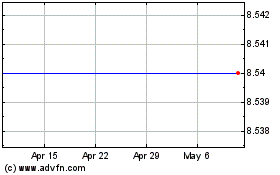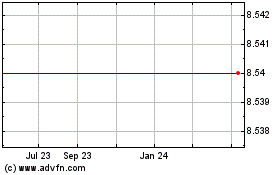Catabasis Pharmaceuticals Presents New Edasalonexent Clinical Biomarker Data Showing NF-kB Inhibition & Target Engagement in ...
June 25 2018 - 3:40PM
Business Wire
Catabasis Pharmaceuticals, Inc. (NASDAQ:CATB), a clinical-stage
biopharmaceutical company, today reported new NF-kB inhibition
biomarker results showing edasalonexent target engagement in the
MoveDMD Phase 2 trial and open-label extension in boys affected by
Duchenne muscular dystrophy (DMD). NF-kB is a fundamental driver of
disease progression in DMD. These results add further support to
the significant NF-kB biomarker results observed in Phase 1 of the
MoveDMD trial and are consistent with significantly decreased
C-reactive protein (CRP) with edasalonexent treatment. These data
were presented today at the New Directions in Biology and Disease
of Skeletal Muscle Conference in New Orleans, LA.
The NF-kB pathway is the key link between loss of dystrophin and
disease manifestation and progression in DMD. Lack of dystrophin
combined with mechanical stress activates NF-kB, which promotes
inflammation and fibrosis, suppresses muscle regeneration and
drives muscle degeneration. Edasalonexent is an oral small molecule
that inhibits NF-kB and improves skeletal, diaphragm and cardiac
disease in mouse and dog models of DMD.
During the off-treatment control period when boys were not
receiving edasalonexent, transcripts of NF-kB-regulated genes
increased in whole blood, consistent with systemic inflammation in
DMD. Gene expression analysis was performed following 12 and 24
weeks of 100 mg/kg of edasalonexent treatment and transcripts of
NF-kB-regulated genes significantly decreased by 2-fold
(p<0.005), showing decreased NF-kB signaling in boys receiving
edasalonexent and consistent with edasalonexent reducing
inflammation.
“We are pleased to see additional clinical evidence
demonstrating the activity of edasalonexent in inhibiting NF-kB in
boys affected by Duchenne, consistent with the observed substantial
slowing of Duchenne disease progression in the assessments of
muscle function and magnetic resonance,” said Andrew Nichols,
Ph.D., Chief Scientific Officer of Catabasis. “Building on the
results previously reported for edasalonexent treatment in patients
in the MoveDMD trial, these new biomarker data further support the
consistent positive edasalonexent results. We look forward to
advancing edasalonexent in a single global Phase 3 trial this year
with the goal of improving the quality and length of life for those
affected by Duchenne.”
The decrease in NF-kB-regulated transcripts with edasalonexent
treatment is consistent with biomarker results that showed CRP was
significantly decreased with edasalonexent at 12, 24, 36 and 48
weeks compared to baseline in the 100 mg/kg treatment group
(p≤0.001). CRP is a well-characterized blood marker that provides a
global assessment of inflammation, and CRP is elevated in boys
affected by DMD. The significant decrease observed in CRP supports
the biological activity of NF-kB inhibition by edasalonexent
treatment decreasing inflammation.
In the Phase 2 and open-label extension of the MoveDMD trial,
edasalonexent substantially slowed DMD disease progression in boys
on 100 mg/kg through more than a year of treatment compared to the
rate of change in the off-treatment control period. Across all
assessments of muscle function, consistent improvements were
observed in the rate of decline after 12, 24, 36, 48 and 60 weeks
of oral 100 mg/kg edasalonexent treatment. Edasalonexent was well
tolerated with no safety signals observed in the trial. The MoveDMD
trial investigated the safety and efficacy of edasalonexent and
enrolled boys not on steroids ages 4 to 7 affected with DMD
regardless of mutation type.
About Edasalonexent (CAT-1004)Edasalonexent (CAT-1004) is
an investigational oral small molecule that is being developed as a
potential disease-modifying therapy for all patients affected by
DMD, regardless of their underlying mutation. Edasalonexent
inhibits NF-kB, a protein that is activated in DMD and drives
inflammation, fibrosis and muscle degeneration and suppresses
muscle regeneration. Edasalonexent continues to be dosed in an
open-label extension of the MoveDMD Phase 2 clinical trial, and
Catabasis is preparing to initiate a single global Phase 3 trial in
the second half of 2018 to evaluate the efficacy and safety of
edasalonexent for registration purposes. The FDA has granted orphan
drug, fast track and rare pediatric disease designations and the
European Commission has granted orphan medicinal product
designation to edasalonexent for the treatment of DMD. For a
summary of clinical results reported to-date, please visit
www.catabasis.com.
About CatabasisAt Catabasis Pharmaceuticals, our mission
is to bring hope and life-changing therapies to patients and their
families. Our lead program is edasalonexent, an NF-kB inhibitor in
development for the treatment of Duchenne muscular dystrophy.
Edasalonexent was designed using our SMART (Safely Metabolized And
Rationally Targeted) Linker drug discovery platform that enables us
to engineer molecules that simultaneously modulate multiple targets
in a disease. For more information on edasalonexent or our drug
discovery platform, please visit www.catabasis.com.
Forward Looking StatementsAny statements in this press
release about future expectations, plans and prospects for the
Company, including statements about future clinical trial plans
including, among other things, statements about the Company’s plans
to commence a single global Phase 3 trial in DMD to evaluate the
efficacy and safety of edasalonexent for registration purposes, and
other statements containing the words “believes,” “anticipates,”
“plans,” “expects,” “may” and similar expressions, constitute
forward-looking statements within the meaning of the Private
Securities Litigation Reform Act of 1995. Actual results may differ
materially from those indicated by such forward-looking statements
as a result of various important factors, including: uncertainties
inherent in the initiation and completion of preclinical studies
and clinical trials and clinical development of the Company’s
product candidates; whether interim results from a clinical trial
will be predictive of the final results of the trial or the results
of future trials; expectations for regulatory approvals to conduct
trials or to market products; the Company’s ability to obtain
financing on acceptable terms and in a timely manner to fund the
Company’s planned Phase 3 trial of edasalonexent in DMD for
registration purposes; availability of funding sufficient for the
Company’s foreseeable and unforeseeable operating expenses and
capital expenditure requirements; other matters that could affect
the availability or commercial potential of the Company’s product
candidates; and general economic and market conditions and other
factors discussed in the “Risk Factors” section of the Company’s
Quarterly Report on Form 10-Q for the quarter ended March 31, 2018,
which is on file with the Securities and Exchange Commission, and
in other filings that the Company may make with the Securities and
Exchange Commission in the future. In addition, the forward-looking
statements included in this press release represent the Company’s
views as of the date of this press release. The Company anticipates
that subsequent events and developments will cause the Company’s
views to change. However, while the Company may elect to update
these forward-looking statements at some point in the future, the
Company specifically disclaims any obligation to do so. These
forward-looking statements should not be relied upon as
representing the Company’s views as of any date subsequent to the
date of this release.
View source
version on businesswire.com: https://www.businesswire.com/news/home/20180625006027/en/
Investor and Media ContactCatabasis
Pharmaceuticals, Inc.Andrea Matthews,
617-349-1971amatthews@catabasis.com
Catabasis Pharmaceuticals (NASDAQ:CATB)
Historical Stock Chart
From Mar 2024 to Apr 2024

Catabasis Pharmaceuticals (NASDAQ:CATB)
Historical Stock Chart
From Apr 2023 to Apr 2024
